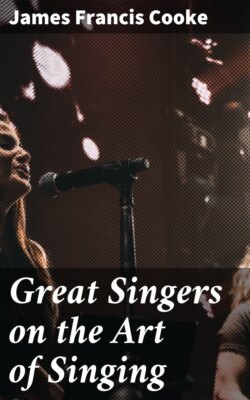Читать книгу Great Singers on the Art of Singing - James Francis Cooke - Страница 4
На сайте Литреса книга снята с продажи.
Vocal Gold Mines and How They are Developed
ОглавлениеPlutarch tells how a Laconian youth picked all the feathers from the scrawny body of a nightingale and when he saw what a tiny thing was left exclaimed,
| "Surely thou art all voice |
| and nothing else!" |
Among the tens of thousands of young men and women who, having heard a few famous singers, suddenly determine to follow the trail of the footlights, there must be a very great number who think that the success of the singer is "voice and nothing else." If this collection of conferences serves to indicate how much more goes into the development of the modern singer than mere voice, the effort will be fruitful.
Nothing is more fascinating in human relations than the medium of communication we call speech. When this is combined with beautiful music in song, its charm is supreme. The conferences collected in this book were secured during a period of from ten to fifteen years; and in every case the notes have been carefully, often microscopically, reviewed and approved by the artist. They are the record of actual accomplishment and not mere metempirical opinions. The general design was directed by the hundreds of questions that had been presented to the writer in his own experience in teaching the art of singing. Only the practical teacher of singing has the opportunity to discover the real needs of the student; and only the artist of wide experience can answer many of the serious questions asked.
The writer's first interest in the subject of voice commenced with the recollection of the wonderfully human and fascinating vocal organ of Henry Ward Beecher, whom he had the joy to know in his early boyhood. The memory of such a voice as that of Beecher is ineradicable. Once, at the same age, he was taken to hear Beecher's rival pulpit orator, the Rev. T. de Witt Talmage, in the Brooklyn Tabernacle. The harsh, raucous, nasal, penetrating, rasping, irritating voice of that clergyman only served to emphasize the delight in listening to Beecher. Then he heard the wonderful orotund organ of Col. Robert J. Ingersoll and the sonorous, mellow voice of Edwin Booth.
Shortly he found himself enlisted as a soprano in the boy choir of a large Episcopal church. While there he became the soloist, singing many of the leading arias from famous oratorios before he was able to identify the musical importance of such works. Then came a long training in piano and in organ playing, followed by public appearances as a pianist and engagements as an organist and choirmaster in different churches. This, coupled with song composition, musical criticism and editing, experience in conducting, managing concerts, accompanying noted singers and, later, in teaching voice for many years, formed a background that is recounted here only to let the reader know that the conferences were not put down by one unacquainted with the actual daily needs of the student, from his earliest efforts to his platform triumphs.
